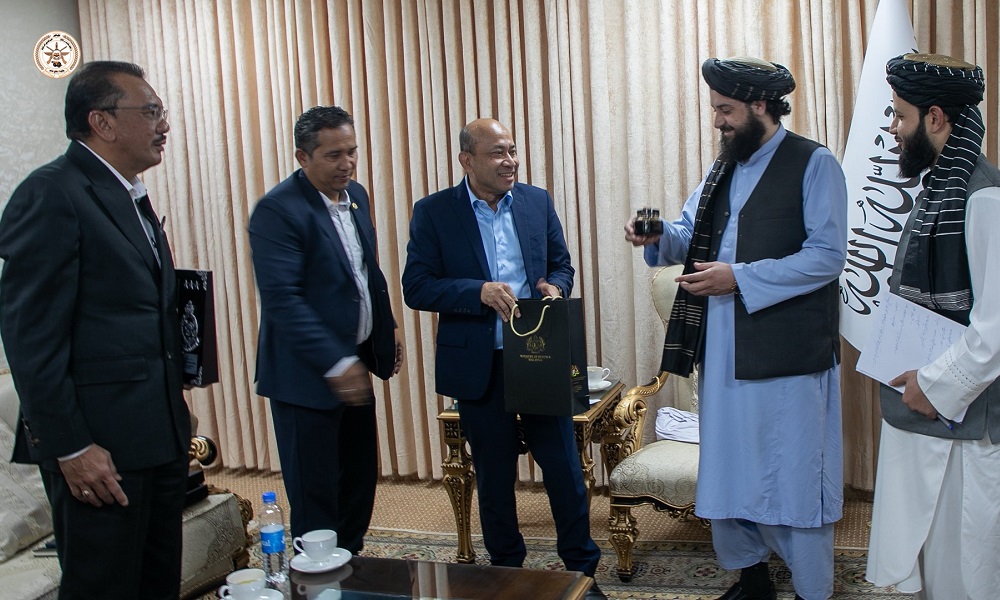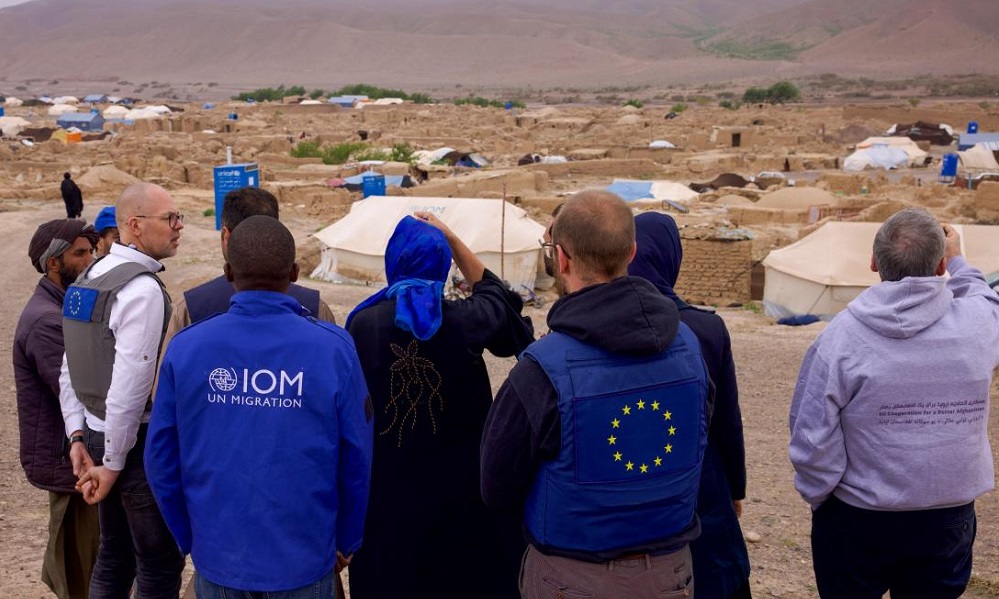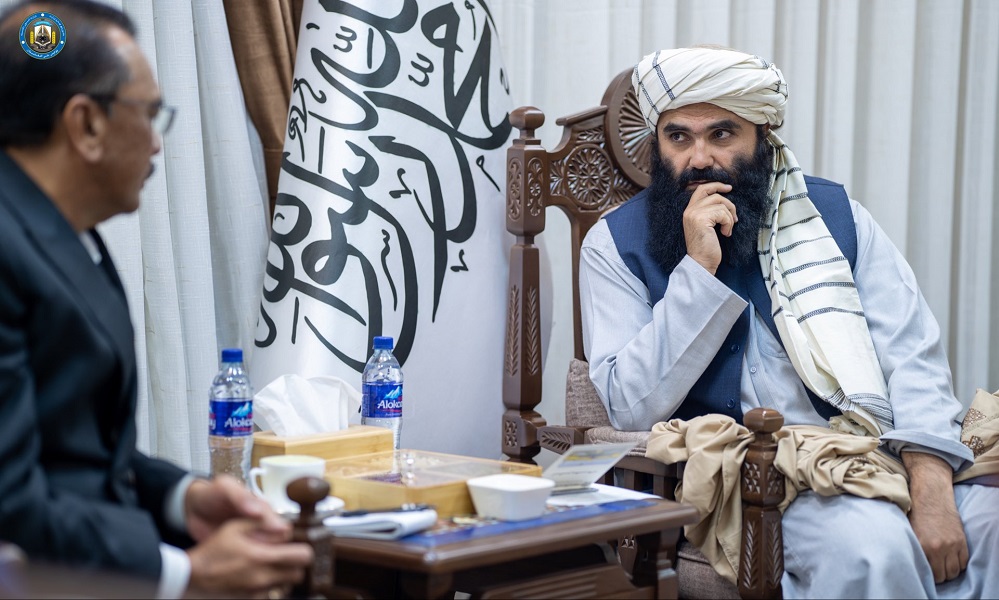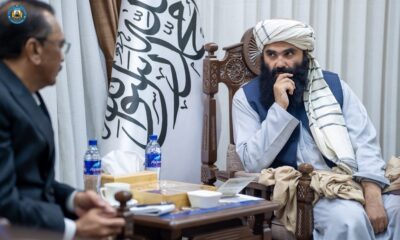Latest News
Abdullah urges Taliban to table their demands in Doha

Abdullah Abdullah, Chairman of the High Council for National Reconciliation on Tuesday called on the Taliban to put their demands on the table so their issues can be discussed.
Speaking at a conference on the establishment of the Women’s Affairs Commission of the HCNR, Abdullah also said that based on information received, Taliban are responsible for most of the targeted attacks in the country.
“Today, unfortunately, most of this information indicates that these acts (recent explosions and targeted killings) are being carried out by the Taliban,” Abdullah said.
Abdullah stated that if the Taliban have something to say or any requests they need to table these so the issues can be discussed by the negotiating teams in Doha.
Abdullah also emphasized that no individual or group can impose their will on the Afghan people by force, and that the Taliban should not see this as an option.
“Well, the negotiating table and the place of negotiations are clear, and the Afghan delegation is there, and there is room for discussion. Whatever argument they [Taliban] have and whatever they want to raise, they can discuss it there. And nothing else can be decided in the absence of the Afghan people, no one can promise the Taliban that this will guarantee their future or that the future of the country will be handed to them; this is the right of the Afghan people and the Afghan people have come to the conclusion that the solution is not war, nor killing people or targeting the people of Afghanistan,” Abdullah added.
“Any side who takes the responsibility for prolonging the war must also consider the consequences. Can one side impose its will on the other people of Afghanistan through war?” he asked.
“If we learn a lesson from the 42 years of war in Afghanistan, it is that a will cannot be imposed on Afghan people by force,” he said.
Meanwhile, the deputy head of the HCNR said that everyone, especially women, are calling for a ceasefire in the country, because people are tired of making sacrifices.
“Afghan women all in one voice call for an immediate ceasefire, and they can no longer afford to lose their loved ones.” Zuhra Mathar Ahmazaim, deputy head of the HCNR said.
The Afghan Republic’s peace negotiating team has been waiting for the Taliban delegation to return to the talks tables for two weeks. However, the Taliban are staying away and have not provided any reasons for this.
Abdullah also said on Tuesday that the Taliban is making statements about who should be in power instead of “discussing this at the negotiating table”.
“In the Islamic Republic of Afghanistan, there is diversity, there are thoughts and opinions, people have rights, and today it is matter of women, in our country, the women of our country have come out; but in the last 40 years they were on the scene, but only in the last 20 years, they (women) have emerged and shown their competence, introduced their powers and abilities, and represented the people well,” Abdullah added.
Abdullah also said women make up half of society and their role in the peace process is crucial.
“The commission will focus on the role of women in the peace process,” Abdullah said.
Women’s rights activists also stressed that their legitimate demands should be considered at the negotiating table.
Latest News
No destructive groups including Daesh present in Afghanistan: Yaqub Mujahid

Acting Minister of National Defense Mohammad Yaqub Mujahid has said that no destructive groups including Daesh have physical presence in Afghanistan, adding the Islamic Emirate of Afghanistan (IEA) will not allow anyone to pose threat to any country in the region from the Afghan soil.
Mujahid made the remarks in a meeting with a delegation from Malaysia in Kabul on Thursday.
According to a statement released by the Ministry of Defense, Mujahid highlighted Malaysia’s “good treatment” of Afghan refugees and its long-standing relations with Afghanistan, and said that Malaysia is a powerful Islamic country and visits should increase.
He added that with the establishment of the Islamic Emirate, occupation and war ended in Afghanistan, and the country is fully secure.
Based on the statement, the Malaysian delegation called Afghanistan a friendly country and while emphasizing on comprehensive cooperation, it assured that what they have seen in Afghanistan will be shared with the authorities of their country.
Latest News
EU allocates 17 million euros to support Afghans on the move

The European Union signed an agreement worth 17 million euros with the International Organization for Migration (IOM) to improve access to basic services, increased economic opportunities and protection for Afghans on the move and their host communities in Afghanistan.
The needs of women and girls are a particular focus of the programme, EU said in a statement released on Thursday.
The statement noted that from January 2023 until April 2024, over 1.5 million Afghans returned from Pakistan and Iran.
“I am deeply moved by the hardship returnees face when being deported to Afghanistan. In a country suffering from poverty and climate change, and in a city that just saw devastating earthquakes, this truly is a crisis within a crisis.”, said Peteris Ustubs, Director for the Middle East, Asia and Pacific of the European Commission’s Department for International Partnerships during the signing ceremony at the IOM transit centre in Herat.
Raffaella Iodice, EU Chargée d’Affaires a.i. to Afghanistan, added “The solidarity of the Afghan people towards their brothers and sisters is an inspiration. We must assure that communities hosting and helping new arrivals are supported. The partnership with IOM ensures access to essential services and provides protection for Afghan returnees and their host communities. As women and girls can be particularly affected, we make sure that all members of society can benefit”.
“IOM’s continued partnership with the EU has been critical in enabling our teams to reach hundreds of thousands of Afghan returnees and other vulnerable communities in the country”, said IOM Afghanistan Chief of Mission, Maria Moita. “Thanks to this renewed commitment, we will be able to focus on addressing the immense challenges in the areas of return and contribute to reintegration, social cohesion, and longer-term solutions for those communities.”
This additional contribution is part of a 5-year programme that is being implemented across Afghanistan and in four countries in the region. It builds on the EU’s previous support to IOM to improve the wellbeing of Afghans forced to return to the country, EU said.
Latest News
Malaysia vows to share its experiences on cyber security with IEA

Acting Minister of Interior Affairs Sirajuddin Haqqani has said in a meeting with a delegation from Malaysia in Kabul that Malaysia is an advanced country and that Afghanistan should use is experiences.
According to a statement released by the Interior Ministry, Haqqani, in the meeting on Thursday, emphasized that security is ensured in Afghanistan and unity among Afghans has been restored.
He stated that the Islamic Emirate wants to have close relations and engagement with the world, especially Islamic countries.
The Malaysian delegation consists of representatives of the Ministries of Interior and Defense, and advisers of the Prime Minister’s Office.
According to the statement, a member of the delegation provided information about Malaysia’s capabilities in cyber security and tackling cyber crime, and said that Malaysia will share its experiences in this field with the Islamic Emirate.
In the meeting, the two sides also discussed the fight against drugs, police training, bilateral cooperation and exchange of experiences between Malaysia and Afghanistan.
-

 Latest News3 days ago
Latest News3 days agoRashid Khan named AWCC’s brand ambassador
-

 Regional4 days ago
Regional4 days agoIranian president lands in Pakistan for three-day visit to mend ties
-

 Climate Change5 days ago
Climate Change5 days agoMassive river flooding expected in China, threatening millions
-

 Sport4 days ago
Sport4 days agoKolkata beat Bengaluru by one run in IPL as Kohli fumes at dismissal
-

 Sport4 days ago
Sport4 days agoACL: Aino Mina 3-0 Istiqlal Kabul; Attack Energy 3-0 Khadim
-

 Climate Change4 days ago
Climate Change4 days agoRescuers race to reach those trapped by floods in China’s Guangdong
-

 Business5 days ago
Business5 days agoAfghanistan, Kazakhstan to hold joint expo in Kabul
-

 World3 days ago
World3 days agoMalaysian navy helicopters collide in mid-air, 10 killed
























